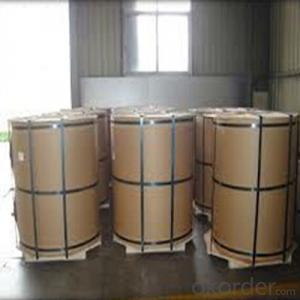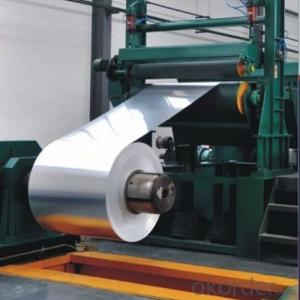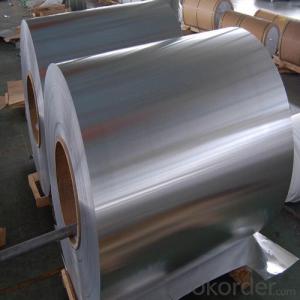Aluminum Sheet in Coil for Pilfer Proof Cap
- Loading Port:
- Shanghai
- Payment Terms:
- TT OR LC
- Min Order Qty:
- 5 m.t
- Supply Capability:
- 10000 m.t/month
OKorder Service Pledge
OKorder Financial Service
You Might Also Like
Item specifice
1.Structure of Aluminum Sheet in Coil for Pilfer Proof Cap Description:
We are a pioneer industry engaged in manufacturing and supplying a versatile range of Bottle Wine
Caps. Our offered product range of wine caps is designed and developed by making use of optimum
grade raw material that is easy in utility and are highly accredited in the industry for their availability
in multifarious sizes, grades and dimensions at competitive prices
2.Main Features of Aluminum Sheet in Coil for Pilfer Proof Cap :
Good Corrosion Resistance
Good Machinability
High Quality
Competitive Price
3. Aluminum Sheet in Coil for Pilfer Proof Cap Images:
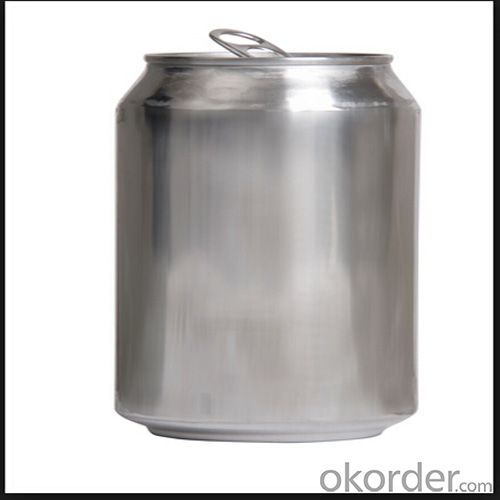
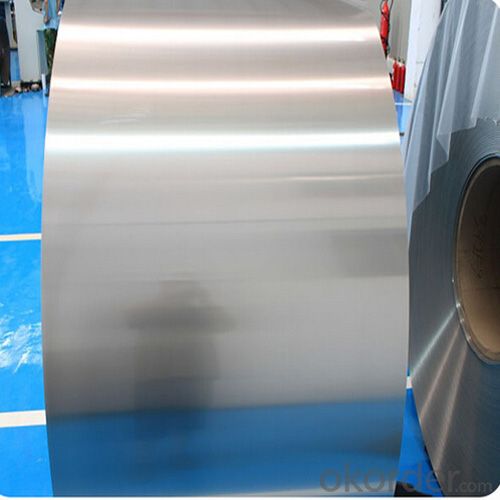
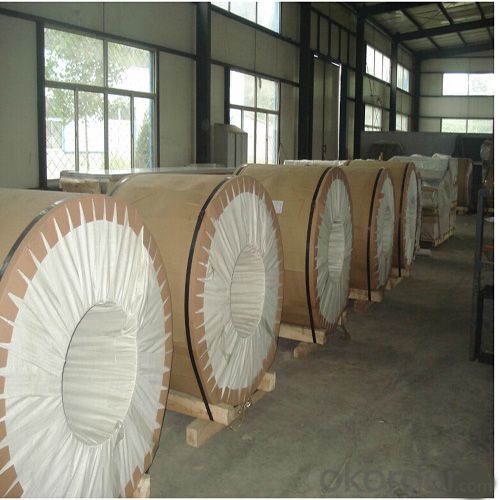
4. Aluminum Sheet in Coil for Pilfer Proof Cap Specification:
| Alloy | Temper | Thickness (mm) | Ultimate Tensile Strength(Mpa) | Earing rate |
| 1100 | H14 | 0.2-0.3 | 110-145 | <2% |
| H16 | 130-165 | <2% | ||
| H18 | 150 | <2% | ||
| 3003 | H14 | 0.2-0.3 | 140-180 | <2% |
| H16 | 165-205 | <2% | ||
| H18 | 180 | <2% | ||
| 3105 | H14 | 0.2-0.3 | 150-200 | <2% |
| H16 | 170-220 | <2% | ||
| H18 | 190 | <2% | ||
| 8011 H14 | H14 | 0.2-0.3 | 125-155 | <2% |
| H16 | 145-180 | <2% | ||
| H18 | 155 | <2% |
5.FAQ
Q1.How long have you been in this product?
A1:More than 10 years.
Q2. What's the minium quantity(MOQ)?
A2. 5 Metric tons
Q3. How long is shipping time?
A3. 7 (ready-made products)-25 days(OEM)
Q4. How do you guarantee the quality?
A4. 1. Cooperating and Exchaning experience with sevral quoted aluminum companies
2. Japanese and Swiss production line and skilled works (regular training and testing)
3. more than 10 years production experience.
Q5. Do you have after sale service?
A5. Yes. Any quality problem occurs within one year, pls take photoes,we will be responsible.
- Q:How are aluminum coils formed into different shapes and profiles?
- Metal forming is the process by which aluminum coils are transformed into various shapes and profiles. This involves applying force to the coil to alter its shape and contour. There are multiple techniques employed for shaping aluminum coils, including rolling, bending, extrusion, and stamping. The most commonly used method for shaping aluminum coils is rolling. This entails passing the coil through a series of rollers that gradually change its shape by applying pressure. The rolling process can be carried out either hot or cold, depending on the desired outcome. Hot rolling is typically used for thicker coils, while cold rolling is suitable for thinner ones. Bending is another technique employed to shape aluminum coils, particularly when creating curved or angled profiles. This can be done manually or with the assistance of specialized bending machines. By exerting force, the coil is bent to the desired shape, creating curves or angles as required. Bending is widely utilized in applications such as HVAC systems, automotive components, and construction. Extrusion is a process in which the aluminum coil is forced through a die to achieve a specific cross-sectional shape. The coil is heated and pushed through the die, which determines the final shape of the extrusion. This method is frequently employed to create intricate profiles with consistent dimensions, such as window frames, door frames, and structural components. Stamping is a technique utilized to produce precise shapes and patterns on the surface of aluminum coils. It involves pressing the coil against a die with the desired design, causing the metal to deform and adopt the shape of the die. Stamping is commonly employed for decorative purposes, such as creating patterns, logos, or text on aluminum sheets. In conclusion, various metal forming methods, namely rolling, bending, extrusion, and stamping, enable aluminum coils to be transformed into diverse shapes and profiles. These processes facilitate the customization and versatility of aluminum in numerous industries and applications.
- Q:What are the different sizes and dimensions of aluminum coils available?
- The sizes and dimensions of aluminum coils vary depending on the specific industry and application. Generally, aluminum coils are available in a range of widths, thicknesses, and lengths to accommodate various needs. In the construction industry, aluminum coils are commonly available in widths ranging from 24 inches to 60 inches. The thicknesses can range from 0.019 inches to 0.040 inches. The lengths of the coils can vary, but standard lengths are typically around 100 feet or more. For industrial and manufacturing purposes, the sizes and dimensions of aluminum coils can be even more diverse. Coils with widths exceeding 60 inches are available for large-scale applications. The thicknesses can range from 0.006 inches for thin, lightweight coils to 0.250 inches for heavy-duty applications. Additionally, the dimensions of aluminum coils can be customized to meet specific requirements. Some manufacturers offer coil slitting services to cut coils into narrower widths, while others can provide custom lengths or thicknesses based on the customer's specifications. It is important to note that the availability of different sizes and dimensions may vary among suppliers. Therefore, it is advisable to consult with a reputable aluminum coil supplier or manufacturer to determine the specific sizes and dimensions they offer.
- Q:What are the tensile strength properties of aluminum coils?
- The tensile strength properties of aluminum coils can vary depending on the specific alloy and temper of the aluminum. Generally, aluminum has a good tensile strength, ranging from 70 to 700 MPa (megapascals). The specific tensile strength of aluminum coils can be determined through material testing and analysis.
- Q:Can aluminum coils be used in the aerospace industry?
- Yes, aluminum coils can be used in the aerospace industry. Aluminum is widely used in the aerospace industry due to its desirable properties such as low density, high strength-to-weight ratio, and excellent corrosion resistance. Aluminum coils are often used in the manufacturing of various aircraft components such as fuselage panels, wings, and structural frameworks. The coils can be easily formed into different shapes and sizes, providing flexibility in design and reducing the overall weight of the aircraft. Additionally, aluminum coils are compatible with different manufacturing processes like welding, machining, and forming, making them an ideal choice for the aerospace industry.
- Q:Why is the hard drive made of aluminum? Why is steel not used, despite being cheaper?
- Hard disk (hard drive) construction. Hard disks are rigid platters, composed of a substrate and a magnetic medium. The substrate – the platter's base material – must be non-magnetic and capable of being machined to a smooth finish. It is made either of aluminum alloy or a mixture of glass and ceramic.
- Q:I have completely disassembled my aluminum bass boat and it is being sandblasted.I am restoring the boat and will be giving it a new paint job.What do you recommend in the way of primer,paint or anything else I need to know.I just don,t want to mess it up by using the wrong thing.Best answer gets a fishing trip in the same boat we are talking about. If you can make it here I will put you on some fish.Catfish,bream,crappie,bass or even saltwater fish.
- Whatever okorder
- Q:Can aluminum coils be used in building facades?
- Yes, aluminum coils can be used in building facades. Aluminum is a popular material choice for building facades due to its numerous benefits. It is lightweight, durable, and corrosion-resistant, making it suitable for exterior applications. Aluminum coils can be formed into various shapes and sizes, allowing for creative and versatile design possibilities. Additionally, aluminum is available in a wide range of finishes, including anodized, painted, and coated, providing further customization options for building facades. Moreover, aluminum is a sustainable material as it is 100% recyclable, making it an environmentally friendly choice for construction projects. Overall, aluminum coils are a viable option for building facades, providing both aesthetic appeal and functional performance.
- Q:Are aluminum coils suitable for automotive body panels?
- Indeed, automotive body panels can be effectively constructed using aluminum coils. The lightweight nature of aluminum greatly contributes to enhancing fuel efficiency and overall vehicle performance. Furthermore, the exceptional corrosion resistance of aluminum makes it an optimal selection for automotive applications, particularly when the panels are frequently subjected to diverse weather conditions. The impressive strength-to-weight ratio of aluminum further ensures outstanding durability and crash resistance. Moreover, aluminum allows for effortless formation and shaping, enabling the creation of intricate and fashionable designs. In conclusion, the utilization of aluminum coils for automotive body panels presents a multitude of benefits, making it a highly favored option for car manufacturers.
- Q:How do aluminum coils contribute to energy-efficient windows and doors?
- The significance of aluminum coils in enhancing the energy efficiency of windows and doors cannot be overstated. To begin with, aluminum, being a highly conductive material, possesses the ability to efficiently transfer heat and cold. This characteristic enables aluminum coils to act as effective thermal barriers, preventing the exchange of heat from the exterior to the interior and vice versa. By reducing heat transfer, aluminum coils assist in minimizing the energy required for cooling or heating a structure, resulting in decreased energy consumption and lower utility bills. In addition, the lightweight and durable nature of aluminum coils makes them a preferred choice in the construction of window and door frames. Their lightweight attribute facilitates easier installation and operation of windows and doors, while their durability ensures long-lasting performance. Furthermore, the usage of aluminum coils permits the creation of sleek and narrow frame designs, optimizing the amount of glass area and allowing ample natural light to enter the building. This reduces the reliance on artificial lighting during daylight hours, further contributing to energy savings. Furthermore, aluminum is a highly recyclable material, and the utilization of aluminum coils promotes sustainability. By incorporating recycled aluminum in the manufacturing of these coils, energy-efficient windows and doors can be produced with a significantly lower carbon footprint. This aids in minimizing the environmental impact of the construction industry and contributes to a more sustainable future. In conclusion, the thermal barrier properties, lightweight and durable nature, as well as the recyclability of aluminum coils, make them indispensable in the creation of energy-efficient windows and doors. By reducing heat transfer, facilitating efficient installation, and decreasing the reliance on artificial lighting, aluminum coils play a vital role in the development of sustainable and energy-saving building solutions.
- Q:What are the common joining techniques used for aluminum coils?
- The common joining techniques used for aluminum coils include welding, soldering, and adhesive bonding.
1. Manufacturer Overview |
|
|---|---|
| Location | |
| Year Established | |
| Annual Output Value | |
| Main Markets | |
| Company Certifications | |
2. Manufacturer Certificates |
|
|---|---|
| a) Certification Name | |
| Range | |
| Reference | |
| Validity Period | |
3. Manufacturer Capability |
|
|---|---|
| a)Trade Capacity | |
| Nearest Port | |
| Export Percentage | |
| No.of Employees in Trade Department | |
| Language Spoken: | |
| b)Factory Information | |
| Factory Size: | |
| No. of Production Lines | |
| Contract Manufacturing | |
| Product Price Range | |
Send your message to us
Aluminum Sheet in Coil for Pilfer Proof Cap
- Loading Port:
- Shanghai
- Payment Terms:
- TT OR LC
- Min Order Qty:
- 5 m.t
- Supply Capability:
- 10000 m.t/month
OKorder Service Pledge
OKorder Financial Service
Similar products
New products
Hot products
Related keywords
